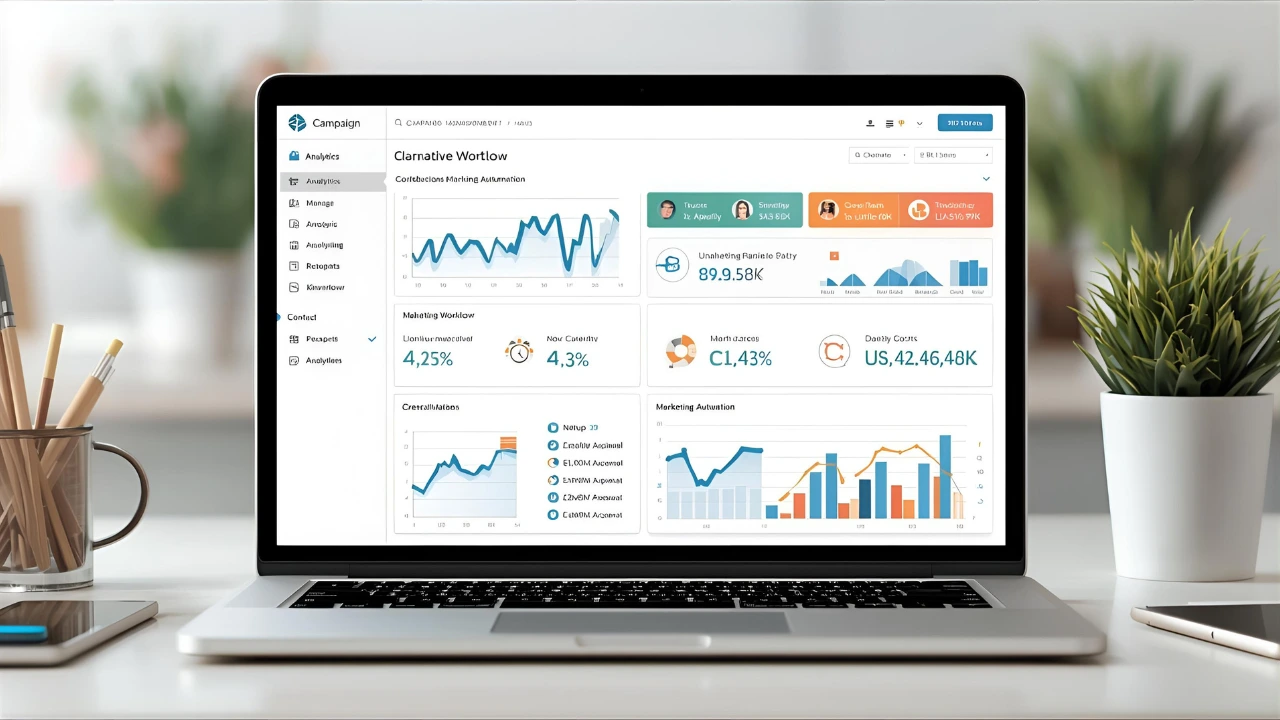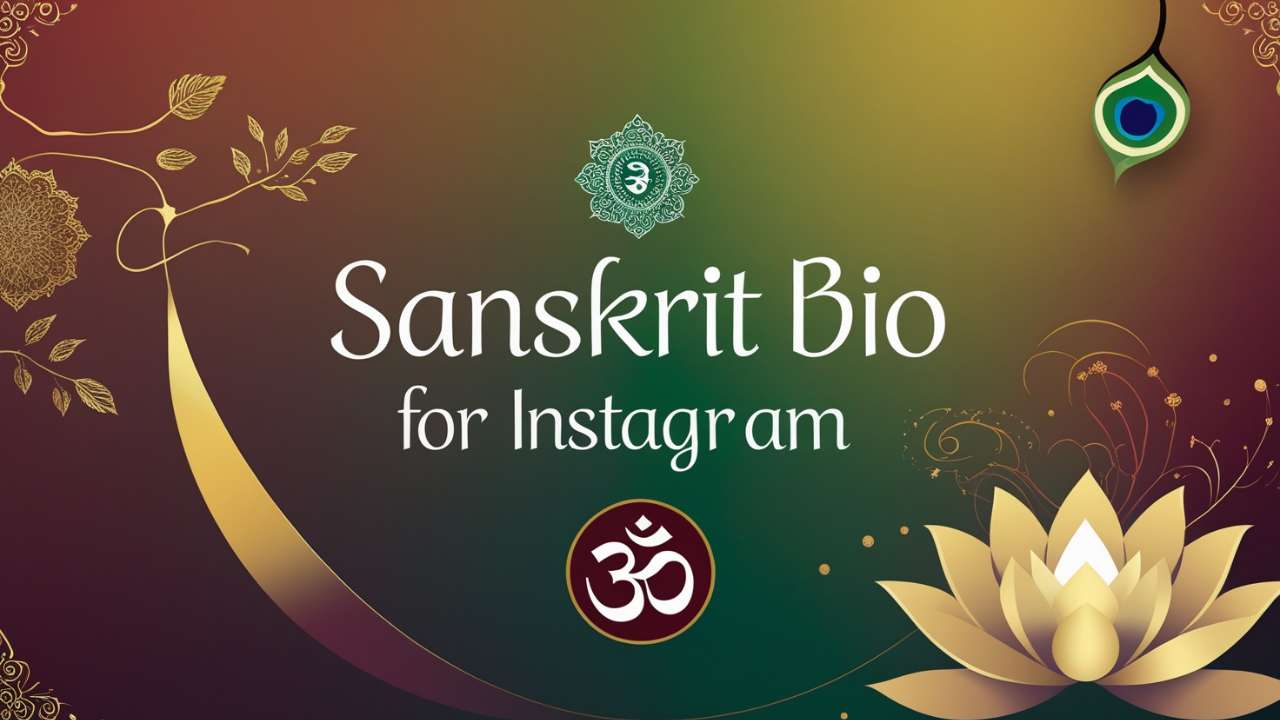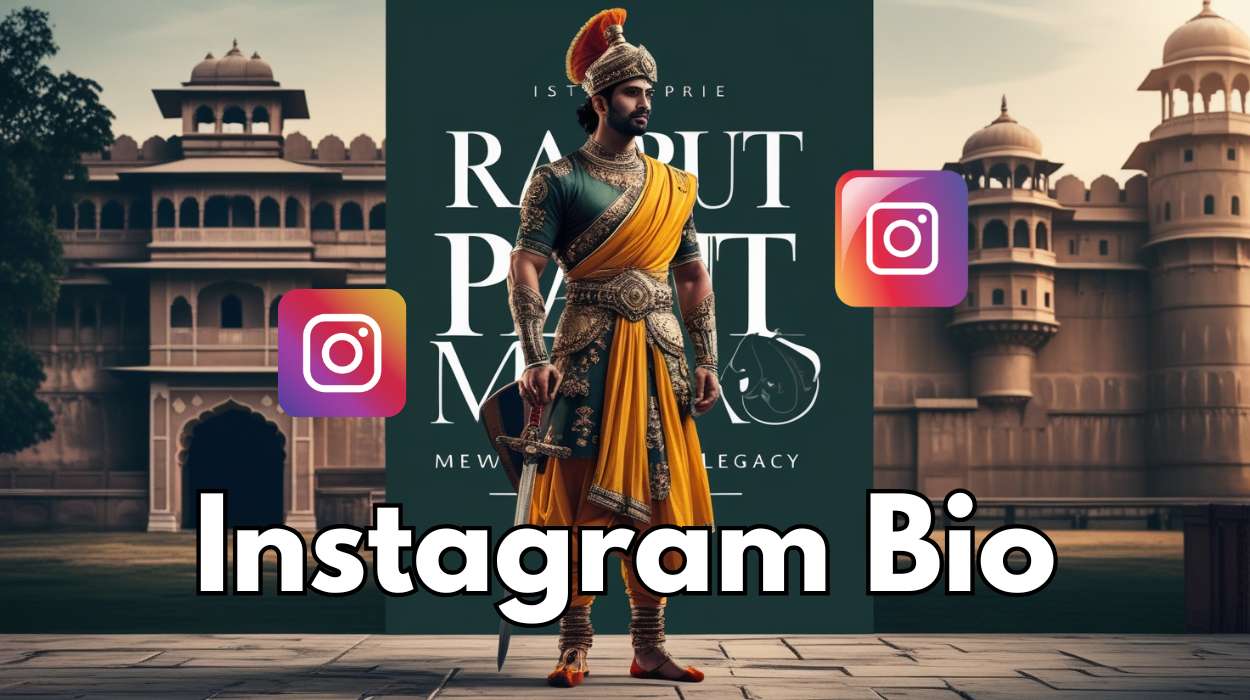Marketing campaign management software is a vital aspect for companies that wish to create, automate, execute, and measure campaigns across several channels. They grant marketers, business owners, online marketers, and advertising firms the capabilities to simplify workflow, connect better with customers, and enhance the efficiency of their campaigns. By bringing automation, analytics, and multi-channel marketing together, they are able to save time and be more productive. At the same time, aligning campaigns with overall business objectives is just as important, which is why many teams also adopt goals management software to ensure marketing activities directly contribute to long-term success.
We have selected the best 15 marketing campaign management software on key parameters such as support for multi-channels (email, social media, PPC), automated capabilities, analytics and reporting, CRM and third-party integrations, simplicity, scalability, cost, and customer support. Whether it is small business campaigns or large enterprise marketing campaigns, these tools offer solutions to meet your needs, providing higher engagement and a better return on investment.
Criteria to Select the Best Marketing Campaign Management Software
The selection of the right marketing campaign management software is necessary for efficient and successful campaign management. Below are the essential points to note:
1. Features & Functionality: It should be capable of supporting multi-channel marketing (email, social media, SMS, and PPC), automation of workflow, A/B testing for campaign optimization, advanced analytics, and audience segmentation for targeted marketing.
2. User-Friendliness: A user-friendly interface with drag-and-drop, editable templates, and a simple dashboard makes campaign creation simple with negligible learning time.
3. Integration Features: It must integrate nicely with CRM applications (Salesforce, HubSpot), email marketing tools (Mailchimp, Brevo), online stores (Shopify, WooCommerce), and analysis tools (Google Analytics) to automate tasks.
4. Scalability & Customization: The platform should be scalable in how well it can deal with business growth, with more options for the customization of workflows, APIs, and user controls.
5. Pricing & Cost-Effectiveness: Opt for transparent pricing with flexible plans, trials, or freemium models. Prevent hidden charges for additional automation, integrations, or users.
6. Customer Support & Training: Excellent customer support via live chat, phone, or email and knowledge bases, tutorials, and community forums guarantee easy adoption.
Choosing the appropriate software based on the above guarantees effective campaign management and improved ROI.
List of 15 Marketing Campaign Management Softwares
1. HubSpot Marketing Hub
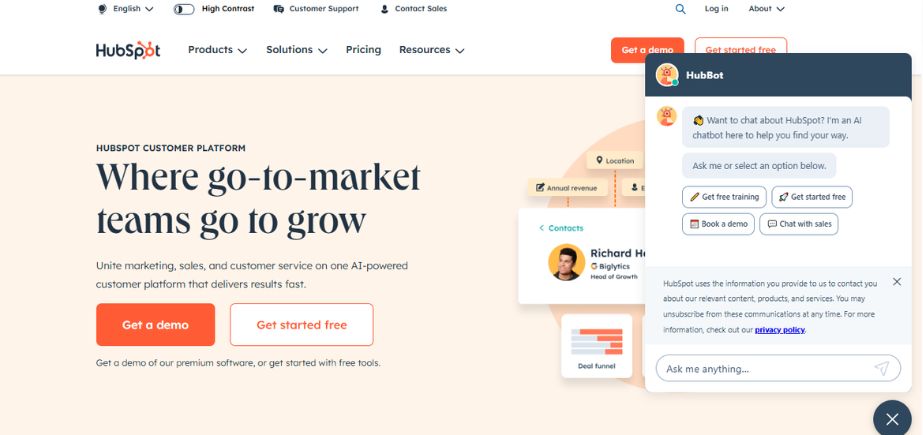
The HubSpot Marketing Hub includes all marketing tools needed for inbound marketing by providing email marketing alongside automation, and landing pages alongside SEO, while integrating with CRMs. A business uses this tool to connect with and convert leads by offering personalized content analysis through its features. Small businesses together with enterprise,s choose this platform because it simplifies marketing automation and reporting as well as enhancing customer relations.
Key Features:
- Email marketing and automation
- Landing page builder
- Lead nurturing and scoring
- CRM integration
- Social media and SEO tools
Pros:
- User-friendly interface
- Extensive integration options
- Strong analytics and reporting
Cons:
- Expensive for small businesses
- Limited features in the free plan
Pricing:
Starts at $800/month; higher-tier plans available.
Who Should Use It?
Businesses are looking for an all-in-one marketing and CRM solution.
2. Marketo Engage (by Adobe)

Marketo Engage functions as a powerful marketing automation platform through Adobe whereby companies build systems to control leads, generate email marketing campaigns, and engage customers. Marketo Engage gives businesses the capability to run customized marketing efforts, conduct automated processes, and evaluate customer communication patterns. Marketo enables marketers to boost revenue growth and lead conversion rates by utilizing AI analysis and CRM system synchronization as they handle prospects through various platforms, starting from email up to social media and websites.
Key Features:
- Lead management and nurturing
- AI-driven personalization
- Account-based marketing
- Advanced analytics and reporting
Pros:
- Scalable for enterprise businesses
- Advanced segmentation and automation
- Strong integration with Adobe tools
Cons:
- Expensive for small businesses
- Steep learning curve
Pricing:
Custom pricing based on business size.
Who Should Use It?
Enterprise businesses needing advanced automation and personalization.
3. Salesforce Marketing Cloud

Salesforce Marketing Cloud functions as a data-centric marketing system that helps businesses construct individualized user paths across email communication and social networks and SMS message delivery and advertising platforms. The platform uses artificial intelligence to automate audience segmentation and presents real-time analytical data capabilities. The deep integration between Salesforce CRM and this solution offers investors a single platform to track customer interactions, thus creating an excellent choice for businesses that wish to improve customer engagement and conversion rates.
Key Features:
- AI-powered customer insights
- Multi-channel campaign automation
- Email and SMS marketing
- CRM integration
Pros:
- Highly customizable
- Scalable for large enterprises
- Strong AI and data analytics
Cons:
- Complex setup and learning curve
- High cost for smaller businesses
Pricing:
custom pricing
Who Should Use It?
Large businesses needing advanced AI-driven marketing automation.
4. Mailchimp
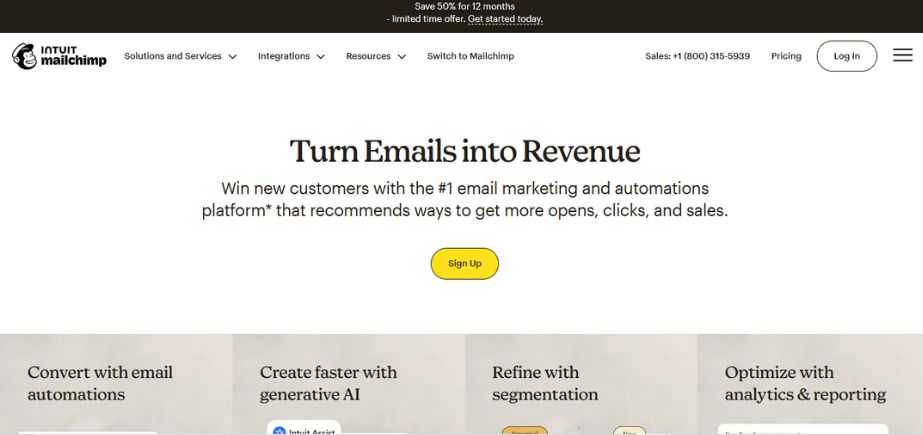
Mailchimp operates as an all-in-one marketing platform that focuses on email marketing automation opportunities together with customer segmentation capabilities. Mailchimp gives users pre-made templates as well as A/B testing and analytics tools aiming to enhance their campaigns. Under its AI-powered recommendation system, Mailchimp helps small businesses and e-commerce brands build customer relationships while improving their marketing strategies by integrating social media.
Key Features:
- Email templates and automation
- Audience segmentation
- A/B testing
- Social media ad management
Pros:
- Easy to use
- Free plan available
- Good for small businesses
Cons:
- Limited automation in lower plans
- Pricing increases with subscriber growth
Pricing:
Free plan available; paid plans start at INR 575 for 12 months
Who Should Use It?
Small businesses and startups looking for email marketing tools.
5. ActiveCampaign
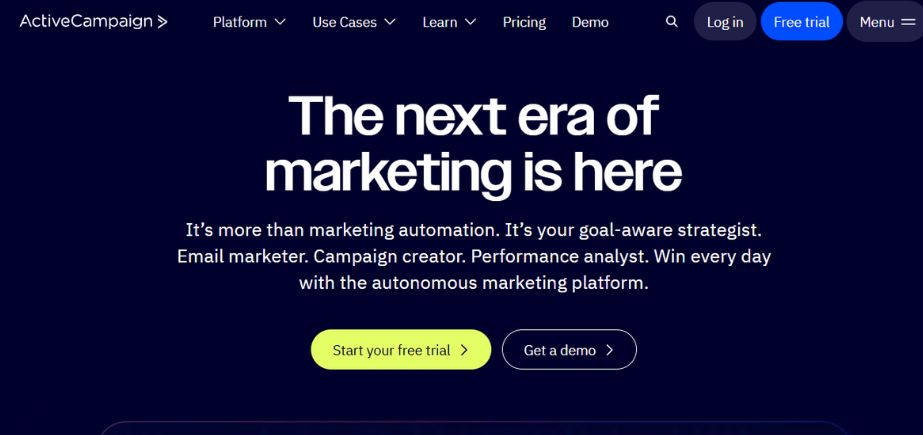
ActiveCampaign provides a marketing automation platform, including CRM features together with AI automation workflow capability. ActiveCampaign enables business users to develop individual email platforms together with audience separation tools and interaction monitoring features. ActiveCampaign delivers effective customer interaction together with conversion-boosting capabilities through its predictive analytics system to attract numerous small and medium-sized business customers.
Key Features:
- Email and SMS automation
- CRM and lead scoring
- AI-driven insights
- Landing page builder
Pros:
- Strong automation and AI tools
- Great for lead nurturing
- Affordable pricing
Cons:
- Can be overwhelming for beginners
- Limited free plan
Pricing:
Starts at $15/month.
Who Should Use It?
Businesses focused on email marketing and lead nurturing.
6. Pardot (by Salesforce)
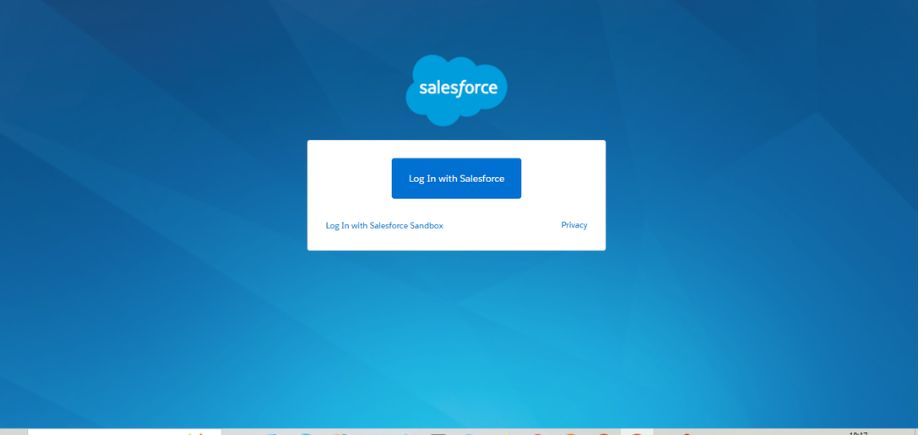
Pardot serves as a business-to-business marketing automation solution that connects smoothly with Salesforce customer relationship management systems. Through Pardot, business operations can stimulate lead generation and lead development by using email marketing in combination with automated processes and analytics features. The combination of AI analytics alongside adaptable landing pages and profit return evaluation tools within Pardot provides effective campaign management and better sales-team synchronization for businesses at an enterprise B2B marketing level.
Key Features:
- Lead scoring and nurturing
- Account-based marketing
- Advanced email automation
- CRM integration
Pros:
- Great for B2B marketing
- Strong Salesforce integration
- Advanced automation tools
Cons:
- Expensive for small businesses
- Learning curve for new users
Pricing:
Starts at $1,250/month.
Who Should Use It?
B2B companies using Salesforce for lead generation.
7. Brevo (formerly Sendinblue)
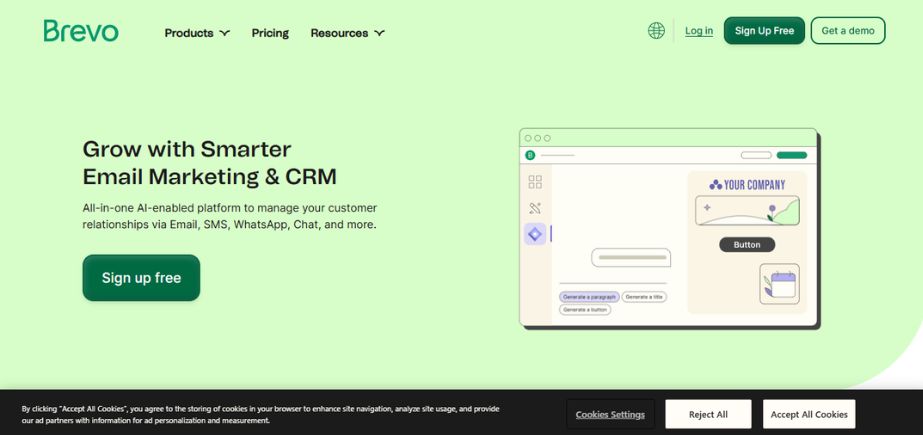
The marketing automation platform Brevo enables businesses to execute email marketing functions and SMS campaigns through its features combined with live chat features and CRM tools. Through its automation tools, Brevo enables business operations for customer flow management and audience segmentation as well as performance tracking across campaigns. Brevo provides an interface that is simple to use with cost-effective pricing plans, which has attracted numerous small- to medium-sized businesses interested in marketing automation.
Key Features:
- Email and SMS marketing
- CRM and automation
- Landing pages and forms
- Transactional email support
Pros:
- Affordable pricing
- Good automation features
- Easy-to-use interface
Cons:
- Limited integrations
- Fewer advanced features than competitors
Pricing:
Free plan available; paid plans start at $9/month.
Who Should Use It?
Small businesses looking for budget-friendly email marketing.
8. GetResponse
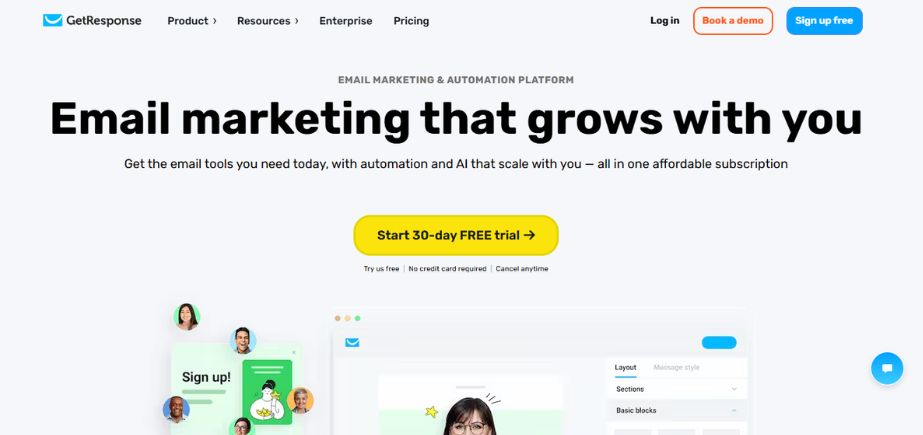
GetResponse provides users with a complete set of email marketing features, which also features automation with landing pages alongside webinars and e-commerce tools. Customers can access AI tools that generate personalized campaigns as well as autoresponders and conversion tracking capabilities. Both users and entrepreneurs widely adopt GetResponse because of its user-friendly design and refined analytic tools to increase sales while engaging customers.
Key Features:
- Email automation
- Landing pages and funnels
- Webinars and chatbots
- E-commerce integrations
Pros:
- Great for e-commerce businesses
- Strong automation tools
- Affordable pricing
Cons:
- Limited free plan
- Some features feel outdated
Pricing:
Starts at ₹1663.13/month.
Who Should Use It?
E-commerce businesses and marketers needing automation.
9. Zoho Campaigns
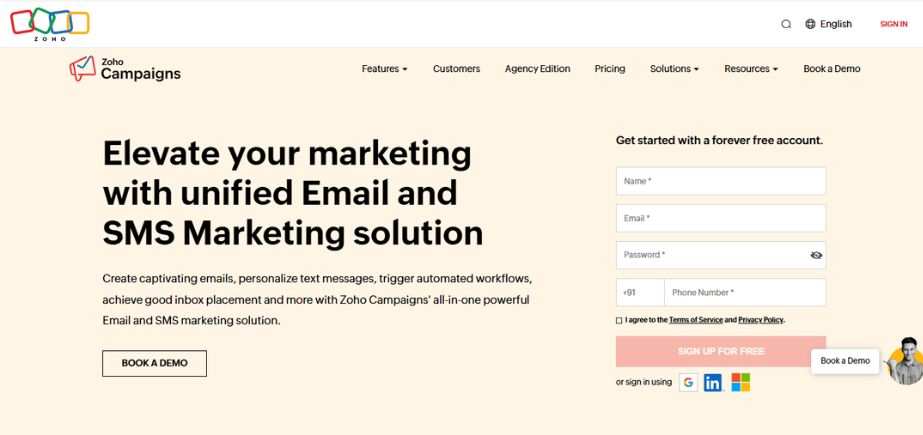
Zoho Campaigns functions as email marketing software that provides integration support for Zoho CRM and other Zoho business platforms. This platform enables organizations to develop marketing emails simultaneously with automation features and, in addition, tracks multiple campaign types through advanced customer group organization. Zoho Campaigns enhances marketing ROI and improves email engagement through the combination of A/B testing with autoresponders and analytics features.
Key Features:
- Drag-and-drop email editor
- List segmentation
- Social media integration
- A/B testing
Pros:
- Affordable pricing
- Integrates well with Zoho ecosystem
- Good automation features
Cons:
- Limited advanced features
- Not as intuitive as competitors
Pricing:
Starts at ₹240/month.
Who Should Use It?
Small businesses and Zoho users.
10. Klaviyo
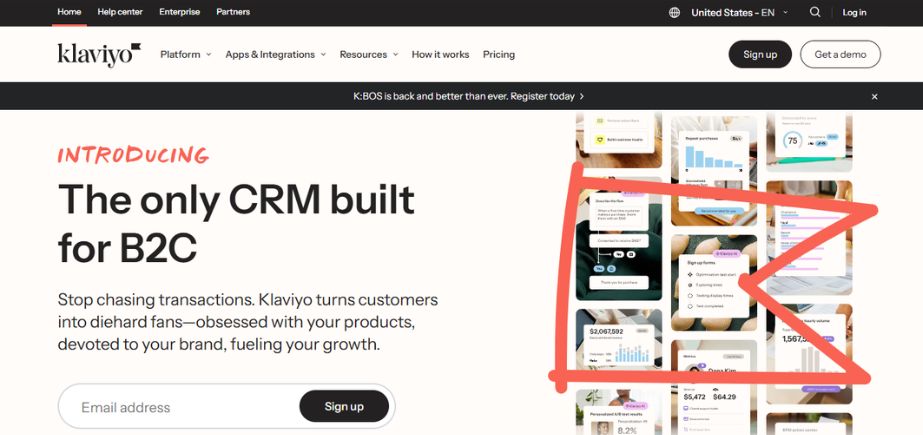
Klaviyo is an automated marketing solution that is specifically designed for online stores. The platform offers analytic email and SMS marketing solutions that integrate intensively with Shopify, WooCommerce, and Magento platforms. With the use of artificial intelligence Klaviyo provides client insights and segmentation features along with predictive analytics which help the brands to maximize personalized marketing campaigns for increased retention and revenue figures
Key Features:
- Email and SMS marketing
- Advanced segmentation
- Pre-built e-commerce templates
- Deep Shopify integration
Pros:
- Great for e-commerce
- Strong automation and analytics
- Free plan available
Cons:
- Expensive for large contact lists
- Learning curve for beginners
Pricing:
Free plan available; paid plans start at $45/month.
Who Should Use It?
E-commerce businesses and Shopify store owners.
11. Keap (formerly Infusionsoft)
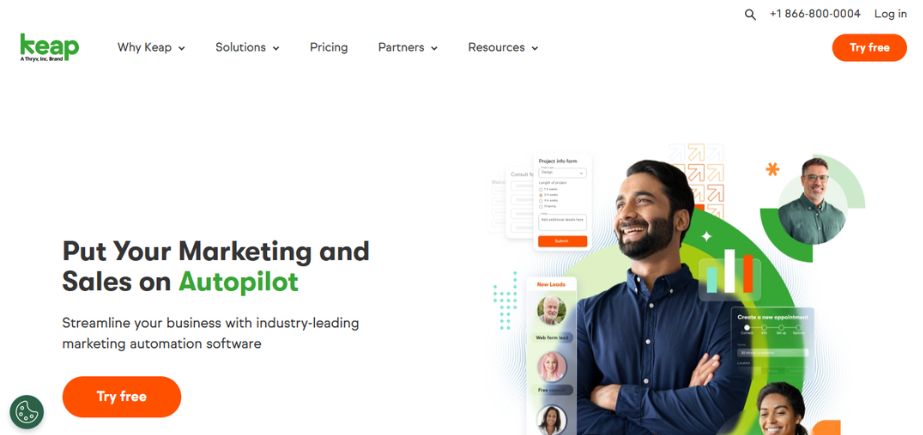
The Keap system provides CRM and marketing automation services for business users at small company levels. Users of Keap gain access to email marketing sales automation together with appointment scheduling and lead management capabilities. Keap enhances business operations through customizable payment methods and workflow improvements that allow organizations to strengthen customer engagement. Entrepreneurs and service-based businesses will find Keap highly suitable because it provides an intuitive interface alongside automation features.
Key Features:
- Email marketing and automation
- Sales pipeline management
- Payment and invoicing integration
- Appointment scheduling
Pros:
- Great for small businesses
- All-in-one CRM and marketing automation
- Strong lead nurturing tools
Cons:
- Expensive compared to competitors
- Learning curve for new users
Pricing:
Starts at $299/month.
Who Should Use It?
Small businesses and entrepreneurs needing CRM and marketing automation.
12. Omnisend
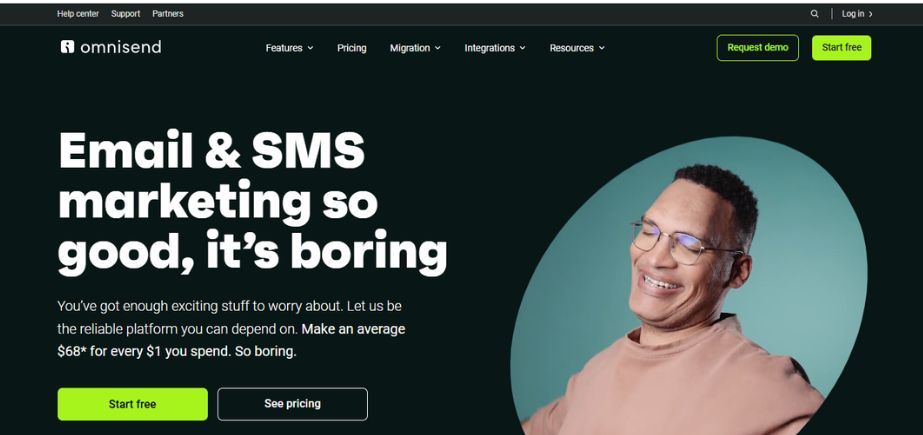
Omnisend functions as an e-commerce marketing automation solution that unites email communication with SMS messages and push notification features. Advanced segmentation remains one of its features, together with pre-built automation workflows as well as audience analytics. Omnisend enables e-merchants to generate more sales by combining product recommendation features with cart recovery message emails.
Key Features:
- Email and SMS marketing
- Automated workflows
- Push notifications
- E-commerce integrations (Shopify, WooCommerce)
Pros:
- Excellent for e-commerce brands
- Multi-channel automation
- Free plan available
Cons:
- Expensive for larger email lists
- Limited non-e-commerce features
Pricing:
Free plan available; paid plans start at $11.20/month.
Who Should Use It?
E-commerce brands looking for multi-channel automation.
13. Campaign Monitor
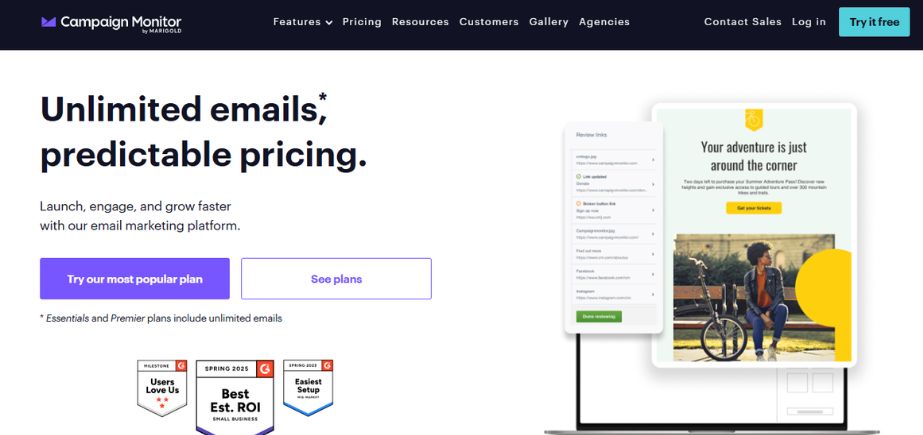
Campaign Monitor provides businesses with a simple email marketing platform that delivers attractive templates through its intuitive system. The platform features automatic email builders together with automation solutions in addition to thorough analysis capabilities. Businesses seeking visually attractive email marketing success alongside detailed feedback should opt for Campaign Monitor because of its A/B testing abilities and segmented audience targeting.
Key Features:
- Drag-and-drop email builder
- Audience segmentation
- Personalized customer journeys
- Real-time analytics
Pros:
- User-friendly interface
- Great for personalized email campaigns
- Strong analytics
Cons:
- Lacks advanced marketing automation features
- Limited integrations compared to competitors
Pricing:
Starts at $12/month.
Who Should Use It?
Businesses looking for simple and effective email marketing.
14. Drip

The e-commerce automation tool Drip specializes in email and SMS advertising while focusing on electronic commerce marketing functions. Through its features, Drip enables the segmentation of customers while using behavioral triggers and automated workflows for conversion enhancement. The integration capabilities between Drip and WooCommerce, as well as Shopify, enable online stores to deliver individualized shopping interfaces for customer loyalty growth.
Key Features:
- Advanced segmentation
- Personalized email and SMS automation
- Shopify and WooCommerce integration
- A/B testing
Pros:
- Built for e-commerce brands
- Strong customer segmentation
- Powerful automation
Cons:
- Expensive for larger contact lists
- Not ideal for non-e-commerce businesses
Pricing:
Starts at $39/month.
Who Should Use It?
E-commerce businesses needing personalized marketing automation.
15. Monday.com Marketing
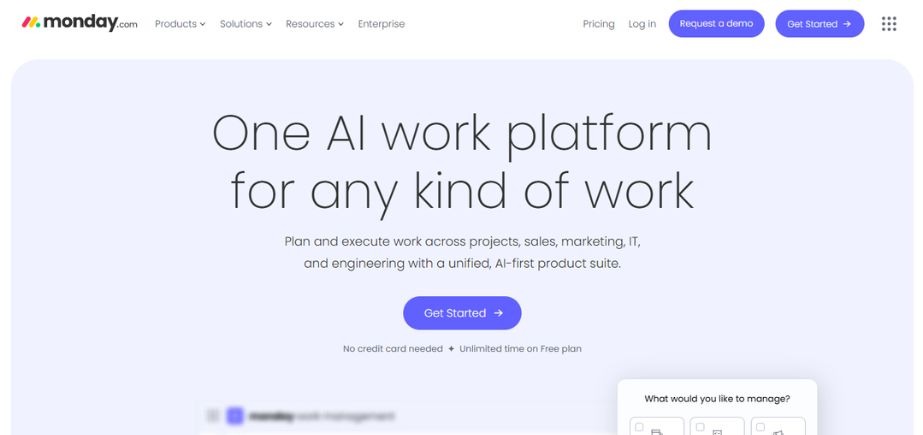
Monday.com Marketing is a project management platform that features marketing campaign management capabilities. Monday.com Marketing enables users to design campaigns with customizable workflows and automated actions in addition to collaboration features for planning, execution, and monitoring. The visualization dashboards of this platform integrate with other marketing platforms, which automates project activities and enhances team operational efficiency.
Key Features:
- Marketing campaign tracking
- Workflow automation
- Team collaboration features
- Integration with third-party tools
Pros:
- Highly customizable
- Great for team collaboration
- User-friendly interface
Cons:
- Lacks built-in email marketing tools
- Requires customization for advanced marketing needs
Pricing:
Starts at $9/month per user.
Who Should Use It?
Marketing teams needing campaign planning and collaboration tools.
Comparison Between Marketing Campaign Management Softwares
Here’s a table comparing the features, pricing, use cases, and websites of the top 15 marketing campaign management softwares :
| Software | Key Features | Pricing (Starting) | Best For | Website |
| HubSpot Marketing Hub | Email marketing, automation, landing pages, analytics, CRM integration | Free; Paid plans start at $800/month | Small to large businesses | hubspot.com |
| Marketo Engage | AI-driven automation, lead management, multi-channel campaigns, analytics | Custom pricing | Enterprises & B2B marketing | adobe.com/marketo |
| Salesforce Marketing Cloud | AI personalization, email & SMS automation, social media marketing, analytics | Custom pricing | Large enterprises | salesforce.com |
| Mailchimp | Email marketing, automation, social media ads, analytics | Free; Paid plans start at INR 575 for 12 months | Small businesses & startups | mailchimp.com |
| ActiveCampaign | Email marketing, automation, lead scoring, CRM integration | Starts at $15 /month | SMBs & e-commerce | activecampaign.com |
| Pardot (by Salesforce) | B2B marketing automation, lead nurturing, AI insights, CRM sync | Starts at $1,250/month | B2B companies & enterprises | salesforce.com/pardot |
| Brevo (formerly Sendinblue) | Email & SMS marketing, automation, CRM, transactional emails | Free; Paid plans start at $9/month | SMBs & e-commerce | brevo.com |
| GetResponse | Email marketing, landing pages, automation, webinars | Free; Paid plans start at ₹1663.13/month | SMBs, bloggers, marketers | getresponse.com |
| Zoho Campaigns | Email automation, segmentation, social media marketing, CRM integration | Free; Paid plans start at ₹240/month | Small businesses | zoho.com/campaigns |
| Klaviyo | Email & SMS marketing, segmentation, AI insights, e-commerce integration | Free; Paid plans start at $45/month | E-commerce businesses | klaviyo.com |
| Keap (formerly Infusionsoft) | CRM, email marketing, automation, appointment scheduling | Starts at $299/month | Small businesses & service providers | keap.com |
| Omnisend | Email & SMS marketing, automation, audience segmentation | Free; Paid plans start at $11.20/month | E-commerce brands | omnisend.com |
| Campaign Monitor | Drag-and-drop email builder, automation, analytics | Starts at $12/month | Agencies & small businesses | campaignmonitor.com |
| Drip | Email & SMS automation, customer segmentation, Shopify integration | Starts at $39/month | E-commerce & DTC brands | drip.com |
| Monday.com Marketing | Campaign planning, collaboration, workflow automation | Starts at $9/user/month | Marketing teams & agencies | monday.com |
Conclusion
Choosing the right marketing campaign management software is a function of your requirements, firm size, and marketing goals. Large organizations and businesses with demanding automation and analysis requirements will stand to gain the most from applying Salesforce Marketing Cloud and Marketo Engage, owing to their powerful AI-based insights and integration with CRM. HubSpot Marketing Hub is suitable for medium firms that require a combined marketing and sales platform with strong automation and customer relationship functionalities.
For startups and small businesses, ActiveCampaign and Mailchimp are simple-to-use platforms offering low-cost automation and email marketing. For e-commerce, Klaviyo and Omnisend are excellent choices with powerful online shop segmentation and personalization capabilities. For marketers on a shoestring budget, Zoho Campaigns and Brevo (formerly Sendinblue) offer low-cost options with basic automation and multi-channel marketing features.
Content and social media marketers will enjoy Monday.com Marketing, which has campaign planning with collaboration features, while GetResponse and Campaign Monitor are great options for email marketing-oriented businesses. For anyone who requires a lightweight option with simple automation, Keap (previously Infusionsoft) is perfect for small businesses handling customer relationships alongside marketing.
Lastly, selecting software depends on your business sector, budget, and required functionality. Evaluating integrations, ease of use, and scalability will ensure that you choose a solution that works for your future marketing strategy.
FAQs
1. What is marketing campaign management software?
Marketing campaign management software enables companies to organize, administer, automate, and measure multiple-channel marketing campaigns, such as email, social media, SMS, and PPC. It accelerates workflows, optimizes targeting, and optimizes ROI.
2. What are the top features to find in marketing campaign management software?
Key features include multi-channel marketing support, automation, analysis, CRM integration, segmentation of audiences, A/B testing, and template customization for campaign setup.
3. Who should use marketing campaign management software?
It is best for marketers, business owners, agencies, and businesses that execute digital marketing campaigns. Whether it is for small companies or big corporations, these tools optimize marketing efforts and monitor performance.
4. What is the top free marketing campaign management software?
Some freemium or free options are HubSpot Marketing Hub (has a free plan), Brevo (previously Sendinblue), and Zoho Campaigns, which provide simple automation, email marketing, and CRM integrations.
5. How do I select the best marketing campaign management software for my company?
Keep in mind aspects such as your business scale, price range, integrations needed, ease of use, scalability, customer support, and features such as AI-powered automation and data analytics.
